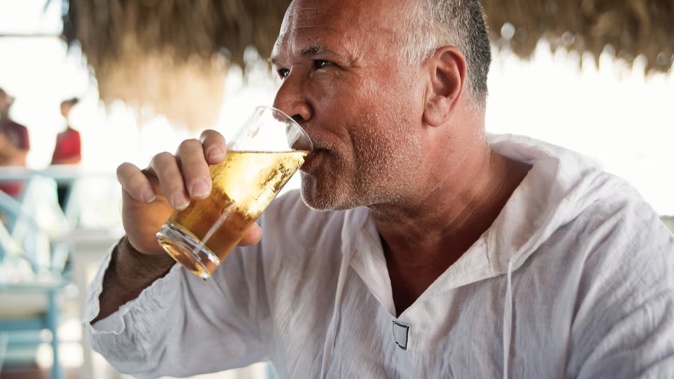
We’re used to associating binge drinking with teenagers and university students glugging booze quite literally by the bucket-load, but in the last decade there’s been a strange shift.
While all statistics suggest members of Gen Z are turning away from the bottle, boomers and Gen X are hitting it harder than ever on both sides of the Atlantic.
According to newly released data from the US Centres for Disease Control and Prevention, the number of alcohol-related deaths in 2020 and 2021 exceeded 178,000, more than all drug overdoses combined. The over-65s accounted for 38 per cent of those deaths.
Debbie Shawcross, a professor of hepatology and chronic liver failure at King’s College London, says a similar trend can be seen in the UK, particularly in women. Data reveal that between 2019 and 2021, female deaths from alcoholic liver disease in the 50-74 age group increased by 36 per cent.
Of course, much of this was driven by the impact of Covid-19 lockdowns, but it also represents a continuation of an ongoing trend. Between 2015 and 2019, the number of women aged 50-74 dying from alcoholic liver disease increased by 15 per cent.
“Our relationship with alcohol should change as we age,” says Dr Federica Amati, head nutritionist at Zoe and author of Every Body Should Know This: The Science of Eating for a Lifetime of Health.

Alcohol tolerance changes over time, so you need to change your consumption habits to minimise the damage. Photo / Getty Images
“Just because we are incredibly flexible in our 20s does not mean that we can continue that kind of drinking in our 30s, 40s and 50s, and expect to have no consequence. We need to understand that we evolve and change with age.”
So how does our ability to tolerate alcohol change as we age? Let’s take a journey through the decades.
20s
According to Dr Amati, the period in which we tolerate alcohol best is probably our mid to late 20s, the phase in our lives when our bodies are most “metabolically flexible”. This means that our liver is more capable of swiftly ramping up enzyme production to metabolise large quantities of alcohol, and the body is more efficient at removing harmful byproducts of booze from the bloodstream before it causes too much harm.
But members of Gen Z may be wiser than their predecessors, with surveys showing one-third of 18 to 24-year-olds in the UK abstain from alcohol completely. This is undoubtedly a positive thing, for while heavy drinking has traditionally been associated with this age group, one’s early 20s is still a critical period when it comes to the development of the frontal part of the brain. This not only governs our ability to make complex decisions, but plays a role in regulating our emotions, which plays a key role in social situations as well as forming and maintaining relationships.
“Alcohol has quite a powerful effect as a neurotoxin,” says Amati. “Our brain is incredibly sensitive to alcohol in the late teens and early 20s because it’s a time [when] a lot of structural change takes place.”
30s
While our alcohol tolerance is still reasonably good in our 30s, this is the decade in which most people will start a family. According to the Office of National Statistics, the average age of first-time mothers and fathers is currently 30 and 33 respectively.
But few men and women realise just how much alcohol can affect their fertility. Research has suggested booze can disrupt the levels of various sex hormones, which in turn can impact the menstrual cycle, making it much harder to time sex for conception as ovulation doesn’t happen in a regular fashion. Alcohol can also impact the ability of the fertilised egg to implant successfully in the lining of the uterus, making miscarriage more likely. Drinking alcohol while trying to conceive can also make men less fertile - one study of more than 1000 men in Denmark also found an intake of just five units (three small beers) per week is sufficient to decrease sperm quality.

Alcohol can affect fertility rates in both men and women. Photo / 123RF
“I work a lot with women trying to conceive or about to undergo IVF or egg-freezing,” says Dr Amati. “You would be surprised how many of them still drink regularly. It takes 90 days for sperm and eggs to mature, so you really need to be not drinking for three months before you start trying.”
40s
According to Sandra Parker, a certified alcohol abuse coach whose company Just The Tonic helps people change their relationship with the drug, this is the decade in which many alcohol addictions can secretly begin, particularly among high-achieving female professionals seeking a release from the pressures of raising children and a successful career.
“At some point, their alcohol consumption shifts from being sociable and fun to a daily crutch to unwind, de-stress and take the edge off,” she says.
Yet by this decade, the organs that metabolise alcohol such as the liver and stomach have already begun to shrink, meaning it stays in one’s system in higher concentrations for longer, exacerbating hangovers. Alcohol also makes your ageing body progressively more dehydrated by suppressing a hormone called vasopressin which tells the kidneys to hold on to fluid.
At this point, we should already be cutting back to just the occasional glass or two of red wine or craft beer. But instead, if we keep drinking at the same rate as we did in our 20s, the calories from consuming excess alcohol can also exacerbate a condition called fatty liver disease, which can ultimately result in more shrinkage, scarring and chronic liver disease.
50s
This is a decade of considerable hormonal flux with women entering menopause. But while some might take to drinking as a way of numbing their symptoms, alcohol can actually exacerbate many of the issues associated with menopause: worsening anxiety, lowering mood and disrupting the body clock even more.
Not that men are exempt. Even moderate alcohol consumption can increase the risk of numerous cancers which begin to strike mid-life, including prostate, liver, colorectal and pancreatic cancer.
However, Shawcross says women are particularly vulnerable to health problems from excessive mid-life drinking, as being typically smaller and having less muscle mass - something which decreases even more following the menopause - means alcohol enters the bloodstream more rapidly.

Post-menopausal women are most at risk of suffering health problems caused by alcohol. Photo / 123RF
“Women have lower levels of the enzyme that breaks down alcohol,” says Shawcross. “Higher levels of [alcohol-related] endotoxins from gut bacteria are found in women compared to men after a single episode of binge-drinking.”
60s
According to the US National Survey on Drug Use and Heavy Drinking, nearly 39 per cent of over-65s report consuming one or two alcoholic drinks per day. However, by our 60s, the decrease in general muscle mass and reduction in liver function which began three decades earlier means our tolerance has roughly halved.
Amati recommends avoiding hard liquor and cocktails and switching to lighter options such as ale and cider, as well as giving your body at least one day off in order to regroup and fully remove the alcohol.
“If you’re currently a scotch or vodka drinker, then switching to one of those lighter alcohols such as beer, cider or wine is likely to be better on the scale,” she says. “And then also always have them with a meal where possible, as this helps slow the absorption into the bloodstream. Extra bonus points if it can be lunch so that it doesn’t impact your sleep, which alcohol does quite badly.”
70s
By this point, one of the biggest risks of drinking is many people are on at least one prescription medication, and alcohol can interact with these drugs, potentially having deadly consequences.
It’s particularly dangerous to mix alcohol with blood pressure medications, like beta blockers and ACE inhibitors, because alcohol can lower blood pressure in the first 12 hours following ingestion, potentially causing dizziness and a raised heartbeat, as well as increasing your risk of falling or passing out.
Amati says that alcohol can have a real impact on cognitive ability, balance and risk of falling for people in their 60s, 70s and 80s. “When you have a combination of multiple medications and regular alcohol consumption, that can be a slippery slope to frailty,” she says.
For people who wish to continue drinking, she recommends reviewing existing prescriptions with your geriatrician and making sure there are no possible alcohol-drug interactions that can put you at risk.
“It’s a big red flag for older people to watch their alcohol intake,” says Amati. “Having that review is so important, because by that stage in your life, if you’ve been used to drinking, you’re probably not going to stop now.”
This article was originally published on the NZ Herald here.
Take your Radio, Podcasts and Music with you









